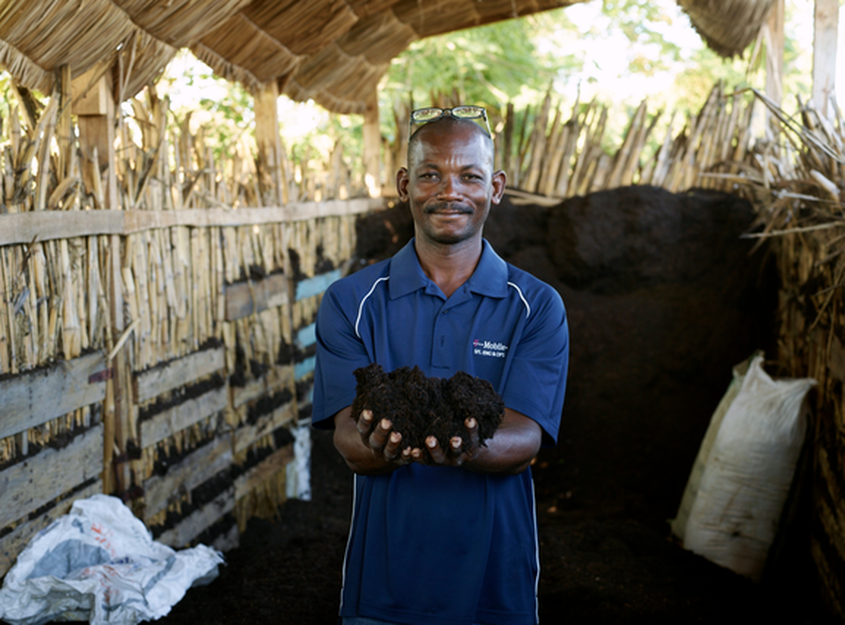|
Part of why SOIL has had the successes they have had in a country where too many projects struggle to deliver is, in part, due to their commitment to intentional collaboration. Pennywise is proud to partner with SOIL and to support the great work they are doing. Read on to hear how SOIL is engaging stakeholders to build resilient sanitation systems! SOIL is committed to working alongside global experts, local communities, and national stakeholders to develop solutions to one of the world’s most challenging crises. Whether it’s through the Container-Based Sanitation Alliance, or with Haitian government, we know that pooling expertise to coordinate efforts, improve implementation, and support knowledge-sharing is the key to future success.
Our team has been hard at work to develop SOIL’s SSP, but we knew we couldn’t stop there because implementing this methodology requires going beyond internal evaluation and necessitates collaboration with local authorities as well. So, late last fall, under the thatch roof of SOIL’s Rural Training Center, that’s just what SOIL’s team did when we gathered representatives of the Haitian government’s cholera response team, the Ministry of the Environment, independent water and sanitation experts, and university students (among others) for a two-day Sanitation Safety Planning workshop.
The workshop included training on risk identification and control prioritization, as well as field visits to observe SOIL’s operations in Northern Haiti. With the SSP framework in mind, participants worked together on a series of exercises to identify public health risks throughout SOIL’s entire service chain, assign potential control mechanisms, and rank risks in order to properly prioritize action steps. Throughout these exercises, participants drew connections between risks in SOIL’s operations and risks in other sanitation models throughout Haiti, from the dangers faced by the bayakou (manual latrine emptiers) to the risks inherent to the septic systems and latrines built in flood zones. These conversations led to convictions to take action through advocacy in government offices and in the community at large. To our delight, this also led to a growing appreciation for SOIL’s dignified, durable, and disaster-resilient model. More than we could have imagined, this diverse group of participants brought unique expertise, energy, and creativity to the table and the results were inspiring! Beyond developing actionable takeaways to improve safety within SOIL’s operations, we were able to bring together a team of powerful stakeholders that cultivated ideas for their long-term action and engagement. Late in the evening on the last day of the workshop, long after it had been intended to have finished, participants were making commitments to action and future roles within in the new SSP teams. People lingered to make plans to stay in touch, and of course take a few pictures to document the new connections made. What’s Next for the SSP Team? Moving forward, SOIL will continue to lead the SSP team through regular meetings and follow-up on individual commitments to action. In the months ahead, SOIL will continue to map risks and develop control measures within our daily operations and integrate proposals based on the workshop. We are looking forward to coming together again to ensure we’re building the most durable and safe sanitation system that we possibly can – and to an even happier, healthier 2018. This important work was funded in part by SOIL’s ReSource Award. Thank you to the Swiss Re Foundation for helping us build safe and resilient sanitation solutions.
0 Comments
Leave a Reply. |
Archives
July 2021
Categories |
- Home
-
Grants
- Current Grantees >
-
Past Grantees & Projects
>
- Anguilla Heritage Assessment Project
- The Bail Project
- Barefoot Artists
- Center for Justice Reform
- Highland Greens
- Kantora Action for Green
- Maher Ashram
- Make Every Woman Count
- New Voices for Reproductive Justice
- Power of Love
- Power Shift Network
- Roberto's Kids
- Steps to End Domestic Violence
- Vermonters for Criminal Justice Reform
- The WASH Foundation
- The Zambia Net-Works Project
- VoteWise
- Urgent Response Fund
- Projects
- Equity Funds
- Annual Reports
- Giving
- Our Team
- Events
PENNYWISE FOUNDATION
P.O. Box 1112 Richmond, VT 05477
Phone: (802) 318-5450
Phone: (802) 318-5450
© The Pennywise Foundation. All rights reserved.




 RSS Feed
RSS Feed